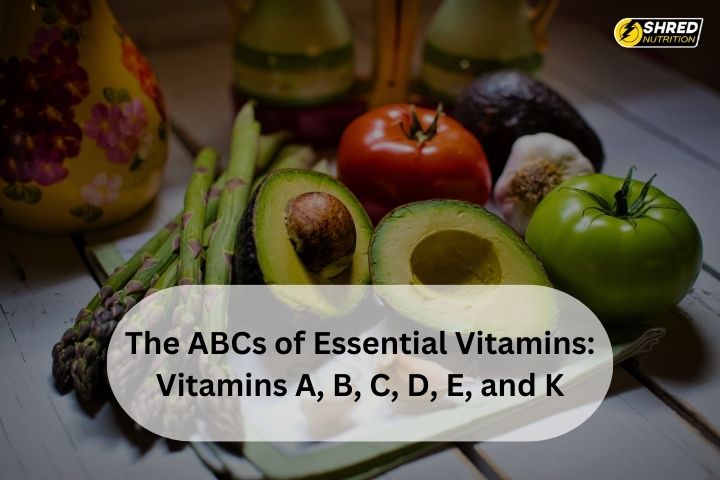Vitamins are organic compounds that our bodies require in small amounts to function optimally. They are essential for a wide range of physiological processes, from supporting our immune system to aiding in energy production and promoting healthy skin, vision, and bone health. In this comprehensive guide, we will explore the fundamental vitamins – A, B, C, D, E, and K – and delve into their individual benefits, sources, and potential health implications.
What are Vitamins and Why Are They Required?
Vitamins are organic compounds that our bodies require in small quantities to carry out vital physiological processes. They serve as coenzymes or cofactors, assisting enzymes in various biochemical reactions that support essential functions within the body. While vitamins are needed in smaller amounts compared to macronutrients like carbohydrates, proteins, and fats, they are no less critical for overall health and well-being.
Vitamins play diverse roles, such as supporting the immune system, promoting cellular growth and repair, aiding in energy production, and maintaining healthy skin, vision, and bone health. Each vitamin is unique in its function and contributes to different bodily processes, making them essential for optimal health.
A balanced diet that includes a variety of nutrient-rich foods is the primary source of obtaining vitamins. Fruits, vegetables, whole grains, lean proteins, and healthy fats provide an array of vitamins necessary for overall well-being. However, certain circumstances, such as dietary restrictions, medical conditions, or specific life stages like pregnancy or aging, may require additional vitamin supplementation to ensure adequate intake.
Now, let’s explore the fundamental vitamins – A, B, C, D, E, and K – in this comprehensive guide and understand their individual benefits, sources, and potential health implications.
Vitamin A: Enhancing Vision and Immunity
Vitamin A is a fat-soluble vitamin that plays a crucial role in promoting good vision, especially in low-light conditions. It is essential for the proper functioning of the retina’s light-sensitive cells, aiding in the conversion of light into nerve signals that are sent to the brain for visual perception. Additionally, vitamin A supports a healthy immune system, helping to fight off infections and maintain overall immune function. This vitamin comes in two forms: preformed vitamin A, found in animal products like liver, fish, and dairy, and provitamin A carotenoids, found in colorful fruits and vegetables such as carrots, sweet potatoes, and spinach.
B-Vitamins: Energizing and Nourishing the Body
The B-vitamins are a group of water-soluble vitamins that play essential roles in various bodily processes. They are involved in energy metabolism, converting the food we eat into usable energy for our cells. B-vitamins also support nerve function, red blood cell production, and healthy skin and hair. This group includes several individual B-vitamins:
B1 (Thiamine): Supports energy production and nerve function. Found in whole grains, nuts, and pork.
B2 (Riboflavin): Helps convert food into energy and supports skin health. Found in dairy products, leafy greens, and fortified cereals.
B3 (Niacin): Supports metabolism and cellular repair. Found in meat, fish, and whole grains.
B5 (Pantothenic Acid): Plays a role in energy production and hormone synthesis. Found in a wide variety of foods, including meat, legumes, and whole grains.
B6 (Pyridoxine): Aids in amino acid metabolism and neurotransmitter synthesis. Found in poultry, fish, and bananas.
B7 (Biotin): Supports healthy hair, skin, and nails. Found in eggs, nuts, and seeds.
B9 (Folic Acid): Important for DNA synthesis and cell division. Crucial for pregnant women to prevent neural tube defects. Found in leafy greens, beans, and fortified grains.
B12 (Cobalamin): Supports nerve function and red blood cell production. Found in animal products, such as meat, fish, and dairy.
Vitamin C: The Mighty Antioxidant
Vitamin C, also known as ascorbic acid, is a water-soluble vitamin and a powerful antioxidant. Antioxidants protect our cells from damage caused by free radicals, which can lead to oxidative stress and contribute to aging and various diseases. Vitamin C is crucial for a healthy immune system, collagen synthesis, wound healing, and enhancing the absorption of non-heme iron from plant-based foods. This vitamin is abundant in citrus fruits, strawberries, bell peppers, broccoli, and spinach.
Vitamin D: The Sunshine Vitamin
Vitamin D is unique because it can be synthesized by our bodies when our skin is exposed to sunlight. This fat-soluble vitamin plays a crucial role in maintaining bone health by aiding in the absorption of calcium and phosphorus from the intestines. Adequate vitamin D levels are essential for preventing conditions like rickets in children and osteomalacia in adults, which are characterized by weak and brittle bones. Vitamin D also supports the immune system, cell growth, and inflammation regulation. Dietary sources of vitamin D include fatty fish, egg yolks, and fortified dairy products.
Vitamin E: The Skin Protector
Vitamin E is a group of fat-soluble compounds known for their antioxidant properties. These compounds protect cells from oxidative damage caused by free radicals, thus contributing to skin health and overall well-being. Vitamin E also plays a role in supporting the immune system and may be beneficial for heart health. Nuts, seeds, vegetable oils, and leafy greens are rich sources of vitamin E.
Vitamin K: Crucial for Blood Clotting and Bone Health
Vitamin K is essential for blood clotting, preventing excessive bleeding in case of injuries. There are two primary forms of vitamin K: K1 (phylloquinone), found in green leafy vegetables like kale, spinach, and broccoli, and K2 (menaquinone), found in fermented foods and animal products like cheese and meat. Vitamin K also supports bone health by aiding in the regulation of calcium in bones and arteries.
In conclusion, understanding the ABCs of essential vitamins – A, B, C, D, E, and K – provides valuable insights into their diverse roles in maintaining our health. A balanced and varied diet, rich in fruits, vegetables, whole grains, and lean protein sources, can help ensure adequate intake of these vital nutrients. For individuals with specific dietary restrictions or medical conditions, supplementation may be necessary to meet their vitamin needs. Always consult with a healthcare professional or registered dietitian to determine the best approach for your individual nutritional requirements and optimize your overall well-being.











